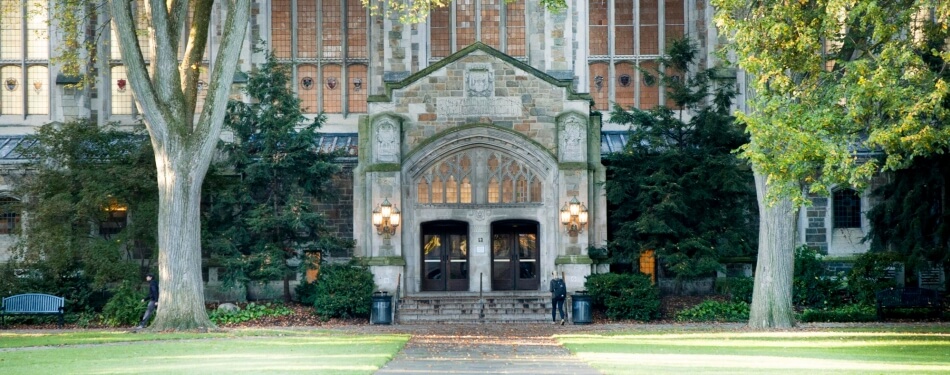Scholars from across the country and beyond gathered at the Law School recently to share research and exchange ideas at the American Law and Economics Association annual meeting.
The 32nd annual event drew nearly 300 people to the Michigan Law campus. At a Friday night dinner, attendees heard welcome remarks from ALEA President James Hines Jr., the L. Hart Wright Collegiate Professor of Law at Michigan Law, and an address from incoming ALEA President Richard Brooks of New York University.
“The conference went extremely well,” Hines said. “Participants came from across the country and world and included many of the biggest names in law and economics, as well as large numbers of very promising young scholars.”
Hines noted that the American Law and Economics Association conference is the premier event in its part of the scholarly world: “It is indicative of the shadow we cast in the law and economics world that the association was eager to have us host the conference.”
The heart of the event was a series of panel discussions at which more than 160 academic papers were presented over two days. Panels covered a wide range of subjects, including Insider Trading and Giving, Judicial Ideology and Philosophy, and Corporations and Public Purposes.
J.J. Prescott—the Henry King Ransom Professor of Law, co-director of the Program in Law and Economics, and co-director of the Empirical Legal Studies Center—served as program chair for the conference. Paul G. Kauper Professor of Law Albert Choi, Senior Research Scholar Naomi Lamoreaux, and Professor of Law Gabriel Rauterberg worked with Prescott on the program committee, and several other faculty members served as area organizers.
“Much of the responsibility for the program falls on the program chair, and J.J. and the program committee simply did a tremendous job, honestly way above and beyond,” Hines said. “Everyone at the conference benefited from J.J. applying his considerable talents to crafting a workable and intellectually exciting program.”
Several of the papers included in the conference were co-authored, and in most cases presented, by Michigan Law faculty members.
For example, as part of the Financial Institutions panel, Assistant Professor Jeffery Zhang presented a paper co-authored with Choi titled “Creditors, Shareholders, and Losers In Between: A Failed Regulatory Experiment.” The paper examines the use of a financial instrument called contingent convertible bonds to provide capital to banks at risk of failure.
Criticizing both the design and implementation of “CoCos,” Zhang concluded, “We’ve also seen these CoCos perform in real life, in real time … If things don’t get better, regulators should think seriously about getting rid of them altogether.”
As part of the Capital Taxation panel, Professor Edward Fox presented a paper co-authored with Zachary Liscow of Yale Law School titled, “Is the Realization Rule the Achilles Heel of the Income Tax? The Income, Taxation, and Borrowing of the Top 1%.”
Their research examines a common belief that the richest U.S. citizens tend to borrow money to fund major spending, because this avoids the income tax they would owe if they sold assets to make their purchases. Fox and Liscow’s work concludes that this practice is important, but rarer than had been believed: “That doesn’t mean that this is not a problem; it just means it’s…less of a problem than you might have thought,” Fox explained.
Other papers from Michigan Law faculty presented at the meeting included:
- Albert H. Choi and George Triantis, “Dynamic Bargaining Power and Contract Modification”
- Gabriel Rauterberg and Sarath Sanga, “Altering Rules: The New Frontier for Corporate Governance”
- Stephen J. Choi, Jessica M. Erickson, and A.C. Pritchard, “Paying for Performance? Attorneys’ Fees in Securities Fraud Class Actions”
- Kyle D. Logue, W. Robert Thomas, and Jeffery Y. Zhang, “Sanctioning Negligent Bankers”
- Julian Arato, “The Institutions of Exceptions”
- Dhruv Aggarwal, Albert H. Choi, and Yoon-Ho Alex Lee, “Retail Investors and Corporate Governance: Evidence from Zero-Commission Trading”
- Francine Lafontaine, Lorenzo G. Luisetto, and J.J. Prescott, “How Do Firms Protect Competitively Sensitive Information? The Case of Franchising”
This year’s conference introduced a new initiative: early-morning, invitation-only roundtable sessions, led by a senior scholar, discussing papers by three junior scholars.
“This was something new for the association, and seemed to work very well, affording the junior scholars the opportunity to receive focused feedback on their work and the chance to connect with conference participants,” Hines said.







